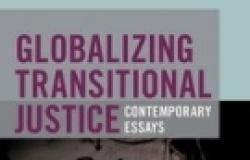Book Review: Globalizing Transitional Justice: Contemporary Essays

Globalizing Transitional Justice: Contemporary Essays by Ruti G. Teitel. Oxford and New York: Oxford University Press, 2014. 256 pp, £55/$85 hardcover 978-0-19-539494-8
Transitional justice practice has developed steadily in the past thirty years since the trials of the leaders of the Argentine junta following its withdrawal in 1983, as has scholarship about it. However, as numerous scholars have noted, the field remains under-theorized, with much of the work being advocacy, grey literature, and studies which assess practice against specific benchmarks. There are exceptions to this generalization, and the work of Ruti Teitel is a notable one. Since her seminal work, Transitional Justice, she has been an influential voice in the field, identifying key conceptual challenges and providing a tour d’horizon of the developments of the field, as it has expanded from local processes to international criminal justice.
This volume encompasses her essays on transitional justice over the course of a decade, offering insights into the development both of her thought and the field itself. As such, it is essential reading for those who seek to understand the rise to prominence, and shifting meanings, of transitional justice in contemporary human rights discourse and practice.
As Teitel observes, and the title betrays, transitional justice has evolved from practice designed to address past human rights abuses by authoritarian states, involving processes initiated by successor regimes, to global practice involving international and internationalized institutions addressing a range of international human rights and international humanitarian law violations. Indeed, as she traces in her previous book, Humanity’s Law, these bodies of law have appeared to converge. In the process, the practice of transitional justice has shifted not only in who conducts it and where, but in the content of crimes addressed and in the nature of the accused. Specifically, transitional justice practice now increasingly focuses upon crimes committed in the context of violent conflict, rather than only authoritarian regimes, and upon crimes committed by state as well as non-state actors.
In the process, new conceptual challenges have emerged. One of the critical arguments Teitel made in Transitional Justice concerned the relationship of constitutionalism and rule of law in transitional times to transitional justice – effectively, how do we think about building such new foundations amid transitions which have ruptured old foundations? This concern persists in this volume, particularly in the final chapter, focusing on how transitional justice can be linked to constitution-building and legitimacy, with South Africa as a critical example.
However, while the conceptual challenge remains, the South African example seems less salient in the context of countries in which transition has not occurred; yet transitional justice mechanisms are instituted and expected either to operate in the absence of transition or expected to enable transition. This is visible both in the context of prosecutions instituted, largely by the International Criminal Court (ICC) during ongoing conflict, and in situations, most notably following the so-called Arab Spring in 2011, in which little or no regime transition has occurred. While Teitel addresses these situations in passing, the volume would have been considerably strengthened had she turned her analysis directly to such situations in one of the essays. A few insights can be found in the comparative discussion of the International Criminal Tribunal for the former Yugoslavia and the Iraqi Special Tribunal: a curious comparison although drawn together by the themes of legitimacy and the rule of law. As she says, “What sort of rule of law do the current trials represent? To some extent, the message is incoherent because of the complexity and the scope of the sought-for normative change in terms of wartime justice, nation-building, and post-conflict justice” (p.121). However, the analysis proceeds to focus upon the efforts to promote legitimacy for any new regime. What is to be done when such mechanisms are utilized, but in an unclear relationship to the existing regime, or by the regime to legitimate itself? Such questions are critical in the context of the various mechanisms instituted across the Middle East and North Africa, and the creation of International Crimes Divisions by the Ugandan and Kenyan states.
Despite the collection’s clear recognition of the evolution of transitional justice towards internationalized justice, it does not directly address the simultaneous shift if not away from state responsibility and state crimes, at least to encompass crimes by non-state actors. One has only to examine the prosecutions before the ICC, before hybrid tribunals, and civil trials under the Alien Tort Claims Act, to see the salience of trials of individuals without any direct connection to the state. As this often occurs in the absence of transition, the meaning and role of trials for constitutionalism, legitimacy and rule of law surely deserves examination. How should we understand, for example, the efforts by Uganda’s President Museveni to use the ICC to target the Lord’s Resistance Army, or by Sierra Leone’s President Kabbah to target the Revolutionary United Front? These were legitimation efforts, but not necessarily ones linked to constitutionalism or rule of law. It would be instructive to learn Teitel’s analyses of these and other such situations.
It is easy to identify lacunae in a book which spans so much territory, situated as it is in an ever-expanding field. However, taken together, these essays do help to scope and analyze the field in ways that few works have done.
Chandra Lekha Sriram is Professor of International Law and International Relations and Co-Director of the Centre on Human Rights in Conflict at the University of East London.


